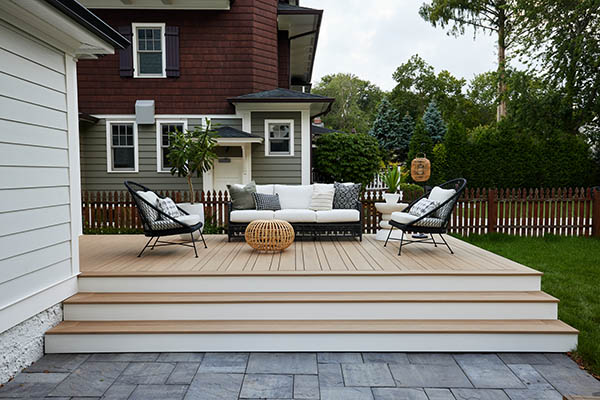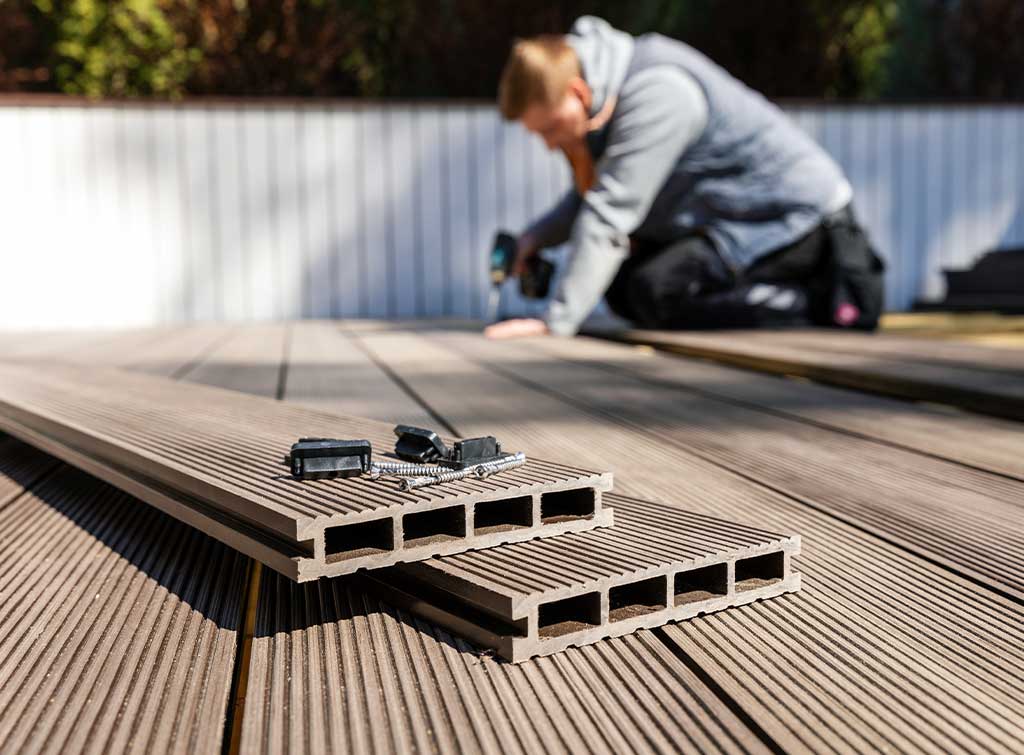Just how to Pick the Right Materials for Your Deck Setup Project
Selecting the ideal products for your deck installment job can appear difficult. The secret is to balance your budget plan, style preferences, and way of living needs to develop a deck that will certainly improve your exterior area for years to come.
Comprehending the Different Types of Deck Products
When embarking on a deck setup job, the choice of materials becomes an essential decision. Different choices are available, each with special qualities and visual appeal. Traditional timber, as an example, provides a classic, natural look and is commonly much more cost-efficient. It can warp over time and requires regular maintenance. Composite materials, on the various other hand, are a mix of timber and plastic, offering toughness and resistance to weather components. They require less maintenance compared to timber but are typically a lot more pricey. An additional alternative is vinyl, which is essentially maintenance-free and resistant to bugs and rot, albeit much less natural-looking. By recognizing these differences, home owners can make a much more educated choice on the most appropriate deck product for their details demands.
Examining the Longevity and Upkeep Requirements of Deck Materials
Analyzing the durability and upkeep needs of deck materials is a critical step in deck installment. Durability includes the product's ability to hold up against severe weather problems, wear and tear, and its longevity.
Understanding maintenance demands is equally crucial. Some materials call for routine securing or staining to maintain their appearance and resist wetness damage, while others, like composite decking, require much less maintenance. By reviewing these factors, one can select one of the most suitable decking material, guaranteeing a balance in between longevity, upkeep requirements, and aesthetic allure.
Cost Analysis: Contrasting Wood and Compound Decking
Although price might at first feel like an additional concern, it is a significant variable when contrasting wood and composite decking. Timber, typically a cheaper choice, has a lower upfront cost. Over time, maintenance expenditures can build up, possibly making timber extra pricey in the lengthy run. These upkeep expenses may consist of discoloration, securing, or changing harmed boards. On the other hand, composite decking, while more expensive initially, calls for less upkeep, possibly decreasing long-lasting costs. It's vital to remember that composite decking isn't impervious to wear and tear, and replacement expenses can be high. Possible deck owners must consider their budget and willingness to preserve their decks when deciding in between timber and composite decking.
Aesthetic Appeals and Design Adaptability of Decking Materials
While expense is a crucial consideration, the aesthetic charm and design flexibility of outdoor decking materials also play a significant duty in the decision-making procedure. Various materials offer differing levels of visual appeal. All-natural timber outdoor decking offers a traditional, ageless look, while composite materials use a vast array of colors and appearances to fit diverse tastes and designs. In a similar way, design adaptability refers to the ability to form and manipulate the outdoor decking material to satisfy specific style needs. Timber, for instance, offers high layout adaptability because of its ease of cutting and shaping. Compound materials, while less versatile in style, are still adaptable sufficient for many deck layouts. These variables, for that reason, are essential factors in the selection of decking material.
Environmental Impact of Decking Materials
When selecting outdoor decking materials, one need to take into consideration not just visual appeals and sturdiness, however likewise the environmental impact. It's crucial to analyze the sustainability of materials and check out recycled outdoor decking alternatives. Comprehending the possible influence on neighborhood environments will guarantee a much more ecologically accountable choice.
Analyzing Material Sustainability
In the world of deck construction, examining product sustainability is an important step. This entails assessing the ecological impact of each prospective material, thinking about elements such as the energy needed for its manufacturing, its carbon footprint, and its end-of-life disposal or recycling options. For instance, wood is a sustainable source, yet unsustainable logging methods can bring about logging. Alternatively, composite outdoor decking products frequently incorporate wood and plastic, lowering the demand for new lumber but boosting reliance on fossil gas. Aluminum and various other steels might be much more sturdy and recyclable, yet their removal and handling can be energy-intensive. Therefore, the selection of decking products should balance performance, aesthetics, price, and sustainability to guarantee an accountable and lasting installment.
Recycled Decking Options

Compound outdoor decking is particularly preferred due to its toughness and convenience of upkeep. Recycled plastic outdoor decking, on the other hand, is extremely resilient and calls for very little upkeep.

Effect On Local Ecological Communities
While the advantages of utilizing recycled materials for outdoor decking can not be overstated, it's just as vital to consider the broader ecological effects of these selections. Correct disposal of old decking is important to minimizing garbage dump waste. Essentially, an eco-conscious deck job demands cautious product option, sustainable sourcing, and responsible disposal.
Making Your Decision: Tips for Choosing the most effective Deck Products
As the write-up transitions right into the subtopic of "Making Your Last Choice: Tips for Selecting the Finest Deck Products", it is critical to recognize the selection of deck products available. Striking a balance between resilience and looks is necessary in this choice procedure. The adhering to conversation will lead viewers in making an enlightened selection based on these key factors to consider.
Recognizing Different Deck Materials
The task of choosing the right products for your deck installation can appear discouraging due to the substantial selection of options readily available. Vinyl or PVC decks are even a lot more durable and call for much less maintenance than composite materials, however they can look less natural. Aluminum decks are strong, lightweight, and resistant to rot, however they are additionally the most costly alternative.
Sturdiness vs. Visual Appeals Balance
Balancing resilience with visual appeals can be a difficulty when picking deck materials. The decision often comes down to personal choices and the deck's planned use. High-traffic locations might necessitate long lasting materials like composite decking, which stands up to wear and tear however might do not have the natural appeal of wood. On the other hand, timber provides a classic allure and heat that synthetic products battle to duplicate. Nonetheless, it calls for more upkeep and may not last as long. Property owners require to strike a balance, thinking about both the deck's functional demands and their aesthetic preferences. page By doing so, they can guarantee their deck remains a functional and eye-catching outdoor space for several years ahead.
Verdict
Finally, picking the right products for your deck setup task requires careful consideration of aspects such as resilience, maintenance, price, looks, and environmental effect. Whether you select traditional timber or composite products, your selection must line up with your find more budget plan, design preferences, and lifestyle. Ultimately, the ideal outdoor decking product is one that enhances your outside area and gives satisfaction for many years ahead.